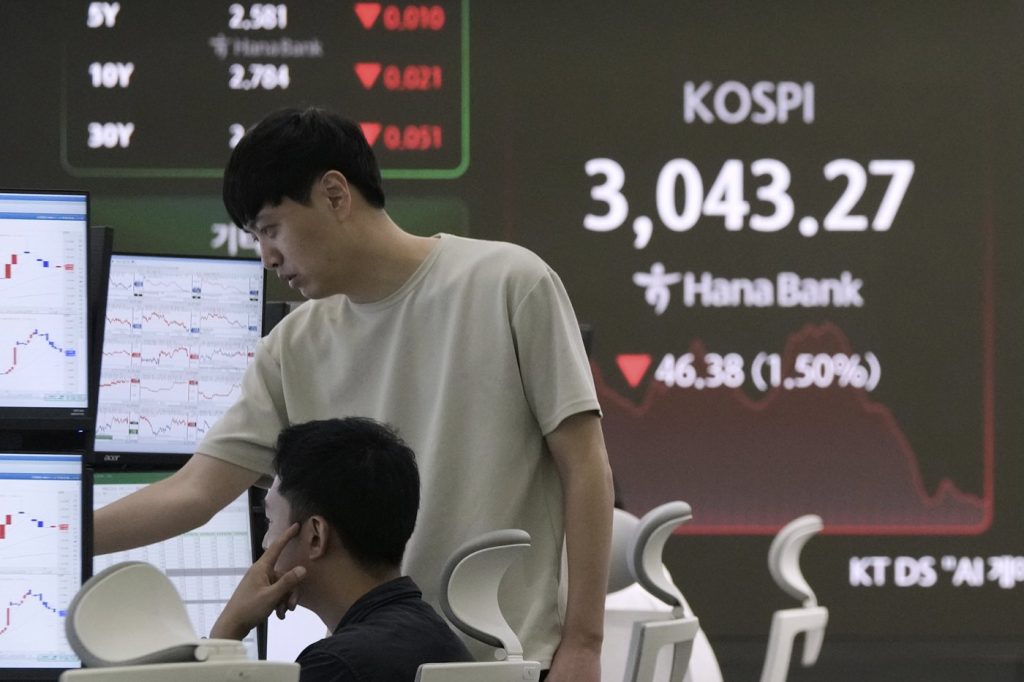MANILA, Philippines (AP) – Asian shares exhibited a mixed performance on Wednesday, reflecting a similar trend observed overnight on Wall Street. Technology stocks, particularly Tesla, faced losses, impacting the momentum that had driven recent record highs in the market. U.S. futures showed modest gains, and oil prices remained relatively stable.
In Japan, shares experienced a drop primarily due to concerns regarding stalled trade negotiations with the United States. The Nikkei 225 index fluctuated but ultimately traded lower by 0.3% at 39,874.33. Stephen Innes, managing partner at SPI Asset Management, emphasized President Donald Trump's announcement indicating that there would be no extension of the tariff pause scheduled to end on July 9. He stated, "The message was blunt: if Tokyo won’t yield, it will pay. Tariffs of 30%, 35%, or whatever number we determine are now openly back on the table. The negotiating table just became a pressure cooker."
Meanwhile, Hong Kong's Hang Seng index rose by 0.6% to 24,220.65, while the Shanghai Composite index decreased slightly, finishing just above 3,456.51. The KOSPI index in South Korea dropped by 1.2% to 3,053.39, influenced by a rise in inflation in June. Conversely, Australia’s S&P ASX 200 saw a modest increase of 0.4%, closing at 8,580.70.
On the U.S. front, the S&P 500 declined by 0.1% to 6,198.01, marking its first loss in four sessions. The Dow Jones Industrial Average, however, experienced a surge of 0.9%, ending at 44,494.94, while the Nasdaq composite fell by 0.8%, settling at 20,202.89. The decline in shares of Tesla contributed significantly to market pressures, particularly due to the deteriorating relationship between CEO Elon Musk and President Trump, which has intensified recently. Tesla's stock plummeted by 5.3% and has experienced a 25.5% decrease in value this year, largely attributed to the ongoing feud between Musk and Trump.
Furthermore, several leading companies in the artificial intelligence sector, such as Nvidia, faced declines, with its shares dropping by 3%, which weighed heavily on the S&P 500. Despite these challenges, more stocks within the index recorded gains, particularly among casino companies rejuvenated by a report indicating robust growth in gaming revenue in Macao, China's renowned casino hub. Las Vegas Sands surged by 8.9%, Wynn Resorts increased by 8.8%, and MGM Resorts International climbed by 7.3%.
Other automakers also enjoyed a positive day, with General Motors shares up by 5.7% and Ford Motor gaining 4.6%. Despite the U.S. stock market recovering substantially from the springtime sell-off of approximately 20%, challenges remain. Notably, one significant concern includes the impending tariffs from Trump, which could adversely affect the economy and aggravate inflation. While many of Trump's proposed import taxes are currently paused, they are set to take effect shortly, with potential implications for economic stability.
There is also growing attention to Washington’s progress on proposed tax cuts and measures that could escalate the U.S. government's debt levels, subsequently leading to higher inflation. This scenario might trigger increased interest rates that would negatively affect the valuation of bonds, stocks, and other investments. Nonetheless, Barclays strategists observe signs of investor euphoria, citing a measure indicating that "excess optimism" in the market is approaching levels reminiscent of past frenzies, such as the "meme stock" frenzy or the dot-com bubble of the late 1990s.
In early Wednesday dealings, benchmark U.S. crude saw a nominal increase of 1 cent, trading at $65.46 per barrel, while Brent crude, the international benchmark, rose by 5 cents to $67.16. The U.S. dollar appreciated slightly against the Japanese yen, increasing to 143.58 yen from 143.41, while the euro slipped to $1.1798 from $1.1808.











